I want to use java-script to validate following criteria for password.
a.A password of at least 8 and no more than 24 characters is required.
b.Every password must contain at least three of these four types of characters:
1.an upper case letter
2.a lower case letter
3.a number
4.a special character.
I have found this code which is really easy and hand-full but it is just checking all 4 conditions not just at-least 3 conditions out of 4.
"^(?=.*[a-z])(?=.*[A-Z])(?=.*\d)(?=.*[$@$!%*?&])[A-Za-z\d$@$!%*?&]{8,24}"
I will really appreciate if you help me to figure out to create javascript validation on password to full fill my above requirement.
Thank you all for your help. I have modified @Ehtesham code and achieved the functionality.
function isValidPassword(pass) {
var lowerRegex = /[a-z]/;
var upperRegex = /[A-Z]/;
var numberRegex = /[0-9]/;
var specialRegex = /[$@$!%*?&]/;
var count = 0;
if (pass.length < 8 || pass.length > 24) {
return false;
}
if (pass.match(lowerRegex)){count += 1;}
if (pass.match(upperRegex)){count += 1;}
if (pass.match(numberRegex)){count += 1;}
if (pass.match(specialRegex)){count += 1;}
if (count >= 3){
return true;
}else{
return false;
}
}
